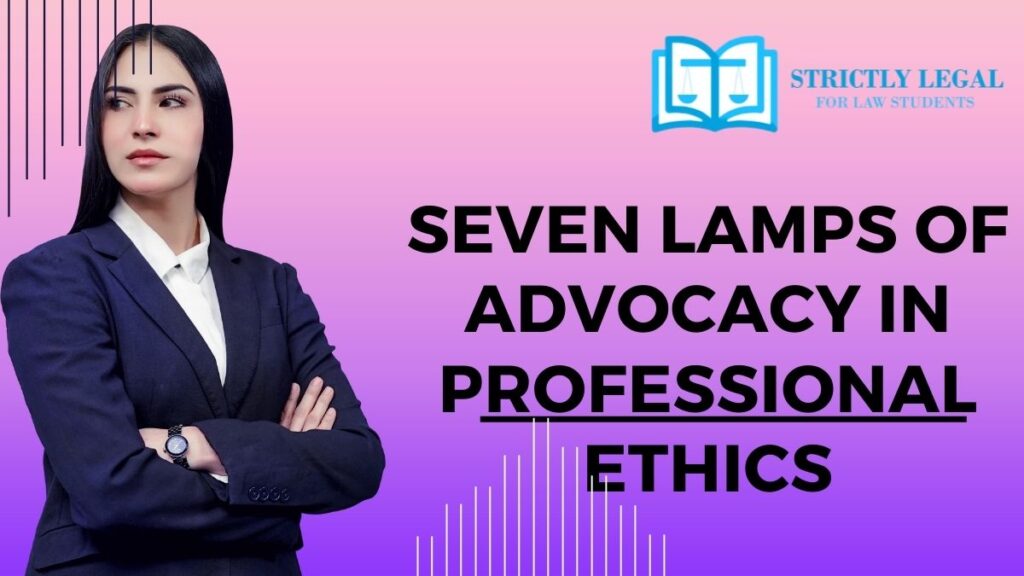In the very famous case of J.S. Jadhav v. Mustafa Haji Mohammad Yusuf, the Honorable Apex Court observed that “Advocacy is not a craft but a calling; a profession wherein devotion to duty constitutes the hallmark. The sincerity of performance and the earnestness of endeavor are the two wings that will bear aloft the advocate to the tower of success. Given these virtues, other qualifications will follow of their own account. This is the reason why the legal profession is regarded as a noble one.” Hence, the fraternity of law concentrated on upholding and fortifying the notion of justice is the similitude of nobility, which must be maintained and followed by the people submerged in it. In usual jargon, the professional ethics deals with the required qualities that circumscribe a well-founded standard of virtuous behavior qua the code of conduct illuminating what an individual is ought to do, that are his rights and duties.
Alike every other profession present in the world, the legal profession is abridged by a code, which is asserted ethics. Evidently, the under structured principle on which this noble profession has built is called professional ethics. Such a legal professional ethics mentions the ethical code that a legal person owns so as to keep pace with the law and justice by keeping a balance in the relationship between the bar and bench.
Table of Contents
The Seven Lamps of Advocacy
The book names “The Seven Lamps of Advocacy” authored by Honorable Justice Abbott Parry, says that to succeed as an advocate a man must work like a horse, and live like a hermit. The seven lamps of advocacy as laid down by Justice Parry are honesty, courage, wit, industry, eloquence, judgement and fellowship.
Honesty
The strong statement usually used by non-law individuals to criticize the advocates or law students is that “lawyers are liars”. However, one cannot ignore the reality that what a common man contends to be a lie may not be a lie in a genuine sense. On the contrary, lawyers are presumed to be honest as they have a fiduciary duty to act in the best interests of their clients. Honesty and straightforwardness bear a resemblance to the quality of not being called on the grasp of cunning, dishonesty, cheating, or any other unethical or criminal behavior. If ever so happens, that would lead to professional misconduct.
Courage
The tie between courage and honesty is undeniable. Polished and up to date knowledge of the law, outspokenness and other qualities of truthfulness will intensify the ability to remain bold and brave under pressure and pain. Courage is the polished quality of persuasive speech, cogent writing, and critical thinking. Successful and good advocates combine extraordinary work ethics with solicitude. Irrespective of how skillful and result oriented an advocate is, he can no way find himself to be an expert unless he has the courage.
Wit
Wit portrays the eager perception and cunningly apt expression of those connections formed between ideas that arouse amusement and pleasure. In common words, it is the volume to think rationally and speak concisely with an insightful expression of thoughts. The very famous phrase “wit lightens the darkness of advocacy” indicates the importance of this lamp. In a nutshell, advocacy is an art of organizing cases in the court of law that includes arguments, producing shreds of evidence and witnesses, cross-examinations, examination in chief and at last the prayer for convincing the judge or the group of judges. It is obvious to say that a planned and well learnt speech is not going to help any advocate in the courtroom.
Industry
This lamp of advocacy endorses advocates to be shining at all the skill sets to sustain and proceed further in the fraternity of law. Law is not static but dynamic as it develops with the needs of the society and modifies to the changing status quo. The adage “There is no alternative to hard work” should be kept recalling the minds of any advocate.
Eloquence
his lamp plays a vital role in evaluating the potentiality of an advocate, which determines the success rate of his career. Eloquence is the art of speaking, in fact, it is a nostrum for all other incompetence. But, it is to be kept in mind that an eloquent speech is way different from a mere deliverable speech because it holds a deep-rooted impact on the bench as well as the clients and the listeners. In short, eloquence refers to an error free and easy flowing fluent communication that has a convincing impact but never advises delivering a grandiloquent speech that sounds better than the reality.
Judgement
The most important lamp in the seven lamps of advocacy is the Judgement. Judgment in advocacy is a talent by which an advocate establishes the collective facts of cases by judiciously identifying both the merits and demerits of the case at hand. Foretelling the probable counterarguments from the opposition and getting to grips with the same by having a cerebral capacity to see the right turning point of the case. In short, it is the deed of translating good sense into good action. An advocate is accountable to let the client know about the correct legal status of the case. He should be proficient at selecting the option which appears righter at the time of the decision, nonetheless, computing on all the possible eventualities that may arise.
Fellowship
While organizing the lawsuits, advocates evidently resist the other party to endorse the interests of their clients. But, in such a battle of words in the courtroom shall not trouble or bother the friendly relationship between advocates of both sides, because they are opponents but not enemies. To ease this interest, after having obtained a Certificate of Enrollment under section 22 of the Advocates Act, 1961, advocates are made required to obtain membership in bar associations.
Conclusion
The collective essence of the aforementioned seven lamps of advocacy illuminates the qualities that are to be present in a successful and good advocate and provides that an advocate has to endorse justice by all fair and honorable means, audaciously. In addition to that, in the book named “Professional conduct and advocacy”, Mr K. N. Krishnaswamy Aiyer instigated one more lamp to the lamps of advocacy called Tact. This eighth lamp i.e. the Tact talks about the people skill across the board and describes why an advocate should develop his ability to deal with people.

Law student.
Believes in penning down thoughts!




